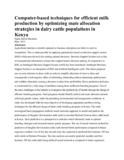| dc.contributor.author | Njubi, David M | |
| dc.date.accessioned | 2012-11-13T12:38:52Z | |
| dc.date.available | 2012-11-13T12:38:52Z | |
| dc.date.issued | 2011 | |
| dc.identifier.uri | http://erepository.uonbi.ac.ke:8080/handle/123456789/6191 | |
| dc.description.abstract | Agricultural practices currently operated as business enterprises are likely to survive competition. This is made possible by applying optimization based on decision support system (DSS) which provide tools for making optimal decisions. Decision Support Systems are a class of computerized information systems that support human decision making. In conjunction to DSS, an Intelligent Decision Support System (mSS) has been introduced. Intelligent Decision Support System is an integration of DSS and Artificial Intelligence (AI). This thesis proposes mss in mate selection in dairy cattle in order to simplify allocation of sires to dams and consequently avoid negative effect of inbreeding. Inbreeding reduces phenotypic performance and viability ultimately causing a decrease in dairy farm profitability.
Dairy production in Kenya is constrained by a wide range of problems among them inefficient breeding programs. One of the main challenges in the industry is to improve the productivity of breeds through the design of efficient breeding programs. Such programs should identify (select) and mate (allocate) animals with high genetic values, under the prevailing environmental and management conditions. A study was developed with the main objective of developing appropriate problem solving techniques for the efficient design of dairy cattle breeding programs in Kenya.
The study investigated back-propagation artificial neural networks approach to model and predicts the performance of daughter first lactation milk yield in recorded Holstein Friesian dairy cattle herds in Kenya. Such prediction is a prerequisite to selection which ultimately leads to optimal breeding strategies and increased annual genetic progress. The use of neural network method for prediction of daughter first lactation milk yield showed better performance compared to linear regression method. Use of test-day records were also explored to predicted first lactation 305-day milk yields in Holstein-Friesians. Test-day analyses accurately predicted monthly and first lactation 305-day milk yield using artificial neural network as compared to linear regression. This is welcome particularly in developing countries which have poor infrastructure for proper milk recording as only few data points would be recorded per lactation.
Knowledge was acquired from the analysis of trained neural network by extracting mating rules. The study showed that neural network rule extraction and decision tables were powerful management tools that allowed the development of advanced and user-friendly decision-support systems for mating strategy designing and evaluating in dairy cattle. A sample of dams and bulls of wide range of production and breeding values was extracted from the database of Holstein Friesian dairy cattle available at Dairy Recording Services of Kenya (DRSK). The data was input to trained networks to obtain predictions of daughter milk production. The neural net outputs were used as inputs for the optimization model. The expected role of computerized mate selection programs in optimizing milk production while minimizing inbreeding was explored using Genetic algorithms (GAs). The study findings indicated GA reduced effect of inbreeding better (5.2 Kg) than linear programming (6.7 Kg) per percentage increased inbreeding.
The results of the computational experience, demonstrated that GA is an appropriate method to explore the search space of these complex problems and offers good solutions in a short time. The study describes the development of a framework for IDSS integrating artificial neural networks for prediction and genetic algorithm for optimization in a mate allocation problem. The IDSS offers a wide range of realistic possibilities for assistance in animal management. The system can be applied to solve mate allocation problem faced by dairy industry desiring to achieve maximum milk yields in choosing the proper animal breeding strategies in view of inbreeding and semen cost. The developed IDSS framework reduces the dependability on the expertise and level of education of the breeder or any farm decision makers.
The results presented in this thesis indicate that huge benefits may be possible from the development of a system to simplify the allocation of sires to dams while simultaneously controlling inbreeding. This thesis includes original papers published in peer reviewed journals. | en_US |
| dc.language.iso | en_US | en_US |
| dc.publisher | University of Nairobi, Kenya | en_US |
| dc.title | Computer-based techniques for efficient milk production by optimizing mate allocation strategies in dairy cattle populations in Kenya | en_US |
| dc.title.alternative | Thesis (PhD) | en_US |
| dc.type | Thesis | en_US |

